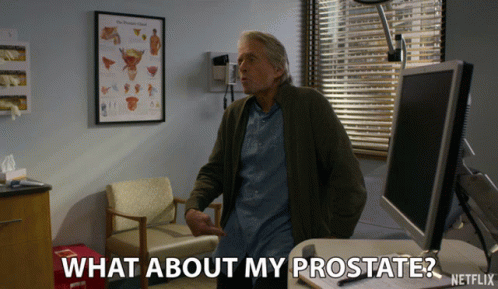
Finding prostate-related gifs isn't easy, but neither is dealing with continuing symptoms of what appears to be chronic prostatitis.
It's still a mystery to me how I got it in the first place. Certainly not through the typical means... from where could an infection have arose?! Well, it seems that antibiotics are effective at treating the symptoms.
I completed an additional 4 weeks of the antibiotics, took prostate supplements, and ate a diet intended for interstitial cystitis (in case my problem was not from the prostate), and my symptoms were 99% gone. Being off the antibiotics for 3-4 days resulted in my symptoms coming back. So I resumed antibiotics again. Symptoms are again improving.
This tells me that whatever infection might be there, whatever the source may be, was not completely eliminated during the first couple of rounds of antibiotics. I'm also wondering whether the antibiotic may be producing an anti-inflammatory effect (which some are known to do). Either way, hopefully an additional 4 weeks will do the trick.
But... I can't be on antibiotics forever. The urologist said this, and I wholeheartedly agree. So what happens if my symptoms come back yet again after I complete these additional 4 weeks? I suppose we'll cross that bridge when we get there. I truly hope we won't have to cross that bridge, though. The prospect is daunting that I might end up having to live with this, and the symptoms can be truly disruptive to many daily activities.
The diet is really a pain in the butt. I already limited many of the less healthy foods in this diet, and over the past month, took out several other healthy foods that were listed there (red tomatoes, onions, etc.) and spicy foods as well, which I actually love. Salad dressing, too. Those were tough to give up.
However, if the issue is indeed the prostate, and not the bladder, then this diet shouldn't really be a factor. Thus, when my symptoms are back to 99% resolved (ideally, 100%) I'm going to test out some of these foods and see whether they trigger symptoms. I already tested a couple of times during the last course, but the timing wasn't ideal. I'm going to control other factors as much as possible so that I can determine, one by one, whether any specific foods are causing the symptoms.
Foods which I already ate rarely or not at all: coffee (stopped 7 months ago... didn't help), chocolate (eat this rarely), canned and nitrate-nitrite-high meats or fish (never eat), nuts (never eat... allergic), certain fruits (allergies to many, so I don't eat them much), alcohol/beer/sodas/carbonated drinks (drink very rarely, once or twice per year), rye/sourdough breads (haven't eaten for years), artificial sweeteners/flavors (avoiding like the cancers they create)
Foods I ate often that I had to give up: spicy (intermittently, but when I eat this, it's in large amounts), vinegar (for salad dressing), mayonnaise/yogurt/sour cream (out of all of these, I ate yogurt the most - the others, infrequently), certain vegetables - tomatoes, onions, some beans (these I ate almost every day, sometimes twice per day)
I've been eating yellow tomatoes because those are supposedly not irritating for most people. I had spicy foods a few times, and I'm pretty sure that onions slipped into my food choices several times, although I was fully aware of them being present maybe one or two times. Overall, I'd say I'm at least 95% consistent with the diet. That's probably far better than most people!
All of this for something I'm relatively sure I don't have - interstitial cystitis. But... not 100% sure. And that's part of the reason this diet sucks. It's taking out some excellent, actually healthy foods out for something I more than likely don't have. What the heck, man. But that's a diagnosis of exclusion, so I'm going to keep at it and test things out when I can. Hopefully sooner than later. I'll also tell the urologist about my little experiments.
Maybe, at the end of the day, the answer to all of this is going to be simple: reduce stress. That, frankly, is going to be the hardest change of all.
Sorry to those who read 100% of this rambling post. Well, hopefully you've at least retrieved a little bit of actual information about the interstitial cystitis diet, plus my way of thinking about diagnosing prostatitis vs. interstitial cystitis, as well as the approach to treatment. The logic behind determining which diagnosis is most likely is something I use many times per day on a near-daily basis for my career.


